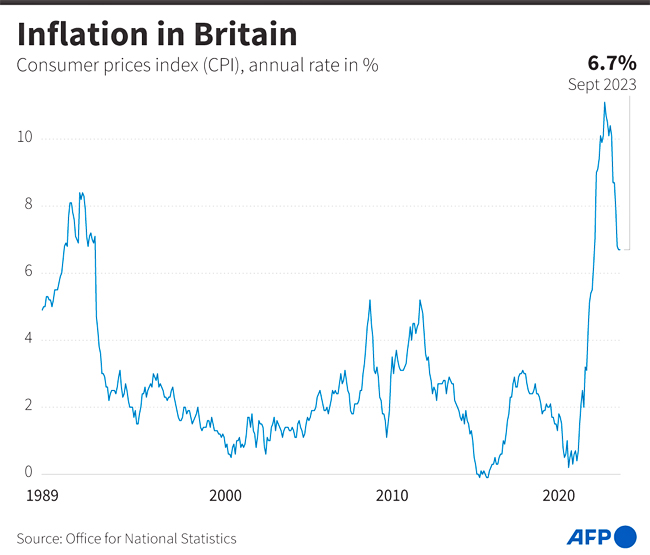LONDON (AFP) – Britain yesterday published retail sales data that added to its economic gloom and offered no respite for the government, which suffered fresh vote setbacks overnight.
Retail sales slid 0.9 per cent in September, the Office for National Statistics (ONS) said in a statement. “Retail sales fell notably in September, with retailers telling us that cost-of-living pressures are influencing consumers, particularly for sales of non-essential goods,” added ONS chief economist Grant Fitzner. “It was a poor month for clothing stores as the warm autumnal conditions reduced sales of colder weather gear,” he added.
The often-volatile retail sales had grown 0.4 per cent in August. A separate survey showed consumer confidence plunging in Britain.
GfK’s Consumer Confidence Index slumped nine points to minus 30 in October, the level seen in July last year. “This sharp fall underlines that the cost-of-living crisis, and simply not having enough money to make ends meet, are still exerting acute pressure for many consumers,” said client strategy director Joe Staton at GfK.
Yesterday’s data comes as Britain’s ruling Conservatives lost two parliament seats to Labour in a another ominous setback for Prime Minister Rishi Sunak and his party ahead of a general election expected next year.


The overnight by-election results – the latest in a string of traditionally safe Tory seats lost to rival parties in recent years – saw Labour overturn huge majorities to further fuel hopes of a return to power after nearly 14 years in opposition.
Official data this week showed British annual inflation remaining elevated, prolonging the cost-of-living crisis and stoking fears that UK interest rates could stay higher for longer.
The Consumer Prices Index held at 6.7 per cent last month, the highest level in the G7 grouping of rich nations.
The ONS yesterday added that the government’s net borrowing undershot expectations last month, at GBP14.3 billion (USD17.5 billion), which may allow it to cut taxes next year in a bid to rally much-needed support ahead of the general election, according to analysts.
“But with the full upward impact on borrowing from higher interest rates and weaker GDP growth still coming down the line, any package of pre-election net tax cuts and/or spending rises will probably need to be modest,” noted Capital Economics’ Ashley Webb.


